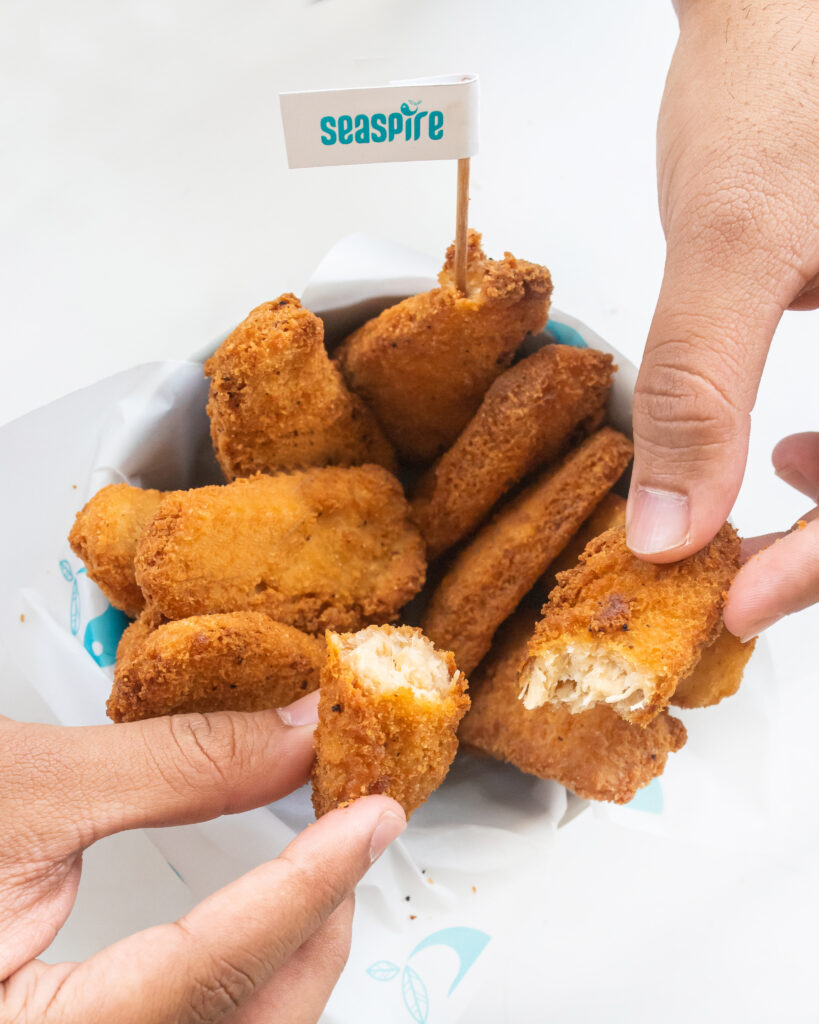
Indian vegan seafood company Seaspire has launched in D2C channels after months of foodservice trials in major cities in its home country. The startup’s co-founder Varun Gagodia tells Green Queen about India’s appetite for alt-seafood, consumer attitudes, why retail isn’t a viable option, and the key to this sector’s success.
Launched in 2021, Seaspire made waves last year after piloting its bio-printed whole-cut vegan snapper at foodservice locations in India and New Zealand. The company claimed its product was the first of its kind in the Asia-Pacific region, and after positive consumer feedback in the trials, it’s now launching in e-commerce channels to present vegan seafood for home cooking applications.
But the products Seaspire has launched on the D2C channel don’t include the whole-cut snapper, which the company expects to continue exclusively in foodservice. “These outlets are highly niche, and we are doing these trials to validate the product use cases in food service,” Gadodia told Green Queen, adding that the snapper’s retail journey still has a few ways to go.
The D2C offerings are plant-based fish fingers, a fish burger and fish mince. The base of the innovations is made from eight ingredients, combining pea and rice protein (which also appears in powdered form) with water, sunflower oil, salt, psyllium husk and algal extracts. The burger and fingers have an additional crumb coating made from wheat flour, spices and condiments.
Gadodia said these ingredients come from multiple sources – “some through leading ingredients houses, and some are proprietary ingredients”. “We are currently outsourcing manufacturing of our commercial products to a leading food manufacturer in India,” he added. “Going forward, we will be looking at decentralising manufacturing based on target markets.”
‘Retail is not commercially viable’ for alt-seafood in India

Seaspire decided to launch into retail after realising that “the early adopters are looking to get these products easily available at their doorsteps”. Gadodia said the company figured this out via some pop-up events. “Essentially, these three products will be still part of the foodservice channel, as we aim to establish multiple use-case applications in regional and continental cuisines,” he confirmed.
But the new products are limited to online stores. “Physical retail is yet not a promising channel in India, what we have learned observing other brands,” explained Gadodia. “There is a huge inventory cost in the supply chain for physical distribution, and [it] is not viable corresponding to market adoption.”
He added that Seaspire’s increased market presence will help it establish commercial bandwidth and introduce further whole-cut plant-based seafood products, which are set to be launched in Q1 2024: “We are already testing our cold-cut fillets of plant-based fish with leading foodservice in business, and hoping to follow [the] pilot exercise for [a] few months until their launch next year.” Moreover, he confirmed that the startup is working on vegan shrimp as it is “in high demand in foodservice” (it may not launch in retail, however).
Seaspire describes the Asia-Pacific region as an “untapped opportunity” for vegan seafood, and while the company has already been operating in India, New Zealand has expanded its B2B presence to Australia and the UAE, it has earmarked Singapore as a potential market for its products too.
Gadodia alluded to a challenging fundraising market and said that while Seaspire hasn’t raised funds from an institutional round, it has been supported by accelerator financing and grants in India and New Zealand. “In a tough funding environment like today, we feel we are fortunate that we are able to optimise [our] business to a great extent, and still deliver good products and access markets,” he explained.
When asked if Seaspire planned to fundraise, he added: “It takes a lot to work with very limited capital. However, it’s very important to stay true to the fundamentals of business and improve cash flows for a better and sustainable business model.”
What Indian consumers want from their food

In terms of its home market, Gadodia noted that India has seen a modest rise in vegan consumption post-pandemic. A report by the country’s Plant Based Foods Industry Association (PBFIA) in May found that veganism has become “increasingly popular” over the last five years in India, with “more than 2% of people actively identifying as vegan”. A December 2021 survey by leading food company Kerry found that 63% of Indians would be willing to buy plant-based products regularly, with 60% not deterred by higher price tags.
However, Gadodia said that higher consumption of vegan food is restricted to “tier one” cities, which would include metropolises like New Delhi, Mumbai and Bangalore. “Tier two” cities are witnessing a rise in traditional plant proteins, he added. “We have also observed that positioning ‘plant-based’ or ‘vegetarian’ protein is much more acceptable in the consumer space than ‘vegan’. Vegan connotations are seemingly turning off a potential audience.”
It aligns with previous research in other markets that highlights what term consumers prefer. A July 2022 ProVeg International survey covering the UK found that respondents were most likely to pick products labelled ‘plant-based’ or ‘veggie’, and least likely to do so with labels that read ‘vegan’ or ‘meatless’. In the US, too, the Plant Based Foods Association found that there’s a stronger preference for the terms ‘plant-based’ and ‘dairy-free’ compared to ‘vegan’ and ‘vegetarian’.
“More than vegan consumption, consumers tend to follow vegetarian diets,” Gadodia added. While there are conflicting figures about the number of vegetarians in India, estimates put it between 20-40%. Even at the lower end, that figure is about 280 million – that’s more than double the entire population of the second-highest on the list, Mexico.
Moreover, eight in 10 Indians say they are reducing meat. Gadodia said targeting just vegans and flexitarians is “only scratching the surface”: “The bigger opportunity is inclusive of all consumers such as vegetarians who are looking for healthy and tasty foods.”
He added: “The Indian consumer space is very complex, and there’s no straight pattern as regional diversity and economics play a huge role in food choices. In general, the demand for protein sources is steadily growing, and many consumers are looking for alternative options to supplement their protein needs. As a thumb rule, India is still a traditional market and consumers rely on regional food preparations. Thus taste, local flavours in preparation and cost parity are crucial [for growth].”
Hybrid proteins could unlock alt-seafood’s potential

While India’s per capita consumption of fish is below the global average – which makes sense given its large vegetarian population – it still ranks among the largest seafood exporters in the world. The PBFIA report explains that as plant-based meat consumption in India “continues to grow, demand for alternative seafood is also expected to increase”. Apart from Seaspire, other brands offering plant-based seafood products in India include Mister Veg, VegetaGold, Veggie Champ and The Mighty Food.
Alternative seafood, Gadodia said, is imperative to cope with the rising demand, as well as tackle climate change: “We aim to leverage traditional channels to supplement with alternative seafood products. Seafood in general is a highly fragmented category, and testing alternative seafood in a traditional market like India will provide us with a strong footing to establish product market fit.”
So far, he noted that consumer response has been positive: “We have definitely managed to outgrow the consumer perception of plant-based products still not [being] quite there. Moreover, consumers have seen a lot of plant-based chicken or deli meats, but seafood is still scarce and that adds [to] the curiosity too.”
Seaspire hopes to “trail the path of technology innovation that can promote growth and adoption of alternative seafood”, said Gadodia. He also hinted that the key to success for alt-seafood in India could be in the confluence of plant-based and cultivated proteins. “More specifically, we believe the category will be unleashed by the rise of biotech-driven solutions – [like] cell-based and synthetic biology – and aim to develop enabling technologies or solutions for hybrid seafood alternatives.”
It involves mixing plant-based proteins with cell-cultured ones to produce a hybrid alternative to meat and seafood. So far, the only company working with cultivated seafood in India is Klevermeat. But as a whole, Asia has a number of food tech firms making strides in this space.
The post ‘Hybrid Could Unleash Alt-Seafood’: Vegan Fish Startup Seaspire on Indian Consumers, Launching in Foodservice and Why Retail Isn’t Viable Yet appeared first on Green Queen.
This post was originally published on Green Queen.